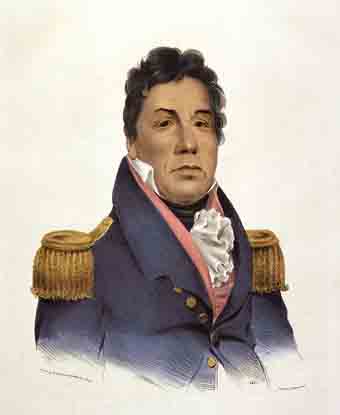Last updated: September 14, 2017
Person
Pushmataha

Mississippi Department of Archives and History
Pushmataha first gained recognition from other Choctaws for his accomplishments as a warrior against various Native enemies of the Choctaws, including the Creeks, the Osages and the Caddos. Traditionally, Choctaw boys acquired an adult male title reflecting their exploits or abilities. Pushmataha's name was translated by anthropologist John Swanton as meaning "a messenger of death; literally one whose rifle, tomahawk, or bow is alike fatal in war or hunting."
Pushmataha opposed Tecumseh's vision of a pan-Indian anti-American military alliance when the Shawnee leader toured Choctaw villages in the summer of 1811. Two years later, as the Red Stick Creeks became more bellicose towards other Creeks and Americans, American officials reached out to Pushmataha.
In the aftermath of the 1813 Red Stick attack on Fort Mims, Pushmataha met with U.S. General Thomas Flournoy in Mobile and gained recognition as a Captain in the U.S. Army. Pushmataha led a grand council meeting of several thousand Choctaws in September 1813 to unite the Choctaws and call for volunteers to fight against their old Creek enemies. By October, Pushmataha commanded a battalion of four companies and enjoyed the rank of Lieutenant Colonel. The Choctaws experienced significant fighting alongside their American allies during the battle at the Creek village of Econachaca (the "Holy Ground") on December 23-24, 1813. For this success, Pushmataha and his warriors returned to their homes to great acclaim. Pushmataha led additional Choctaw fighting forces against the Redsticks along the Tombigbee River in the spring of 1814. Promoted to the rank of brigadier general, he and his men then joined Major Uriah Blue's detachment that patrolled the Gulf Coast that fall and captured Pensacola in November.
After the War of 1812, Pushmataha no longer participated in war but continued to represent his people in diplomatic meetings with the United States. On October 18, 1820, the Choctaws met with U.S officials, including Andrew Jackson, and ceded land in the Treaty of Doak's Stand. Under the terms of the treaty, the Choctaws were to cede half of their land in what was by then the state of Mississippi in exchange for land in Arkansas. During the proceedings, Pushmataha accused Jackson of exaggerating the quality of the western land. In 1824, Pushmataha and other Choctaw chiefs travelled to Washington, D.C. for further negotiations about this flawed treaty. While there, Pushmataha posed for a portrait by renowned painter Charles Bird King, yet not long after his portrait was completed, Pushmataha fell ill and died. He was given a military funeral and is buried in the Congressional Cemetery in Washington.
